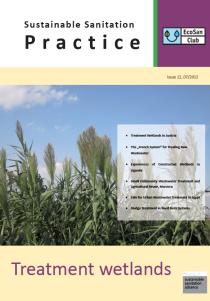
Published in: 2012
Publisher:
Sustainable Sanitation Practice (SSP), Issue 12. EcoSan Club, Austria
Author:
Muellegger, E., Langergraber, G., Lechner, M., EcoSan Club (eds.)
Uploaded by:
SuSanA secretariat
Partner profile:
common upload
7155 Views
238 Downloads
Location of library entry
Content - Summary
Natural wetlands have been used for wastewater treatment for centuries. In many cases, however, the reasoning behind this use was disposal, rather than treatment and the wetland simply served as a convenient recipient that was closer than the nearest river or other waterway. Constructed treatment wetlands are engineered systems designed and constructed to utilize the natural processes involving wetland vegetation, soils, and their associated microbial assemblages to assist in treating water. They are designed to take advantage of many of the same processes that occur in natural wetlands, but do so within a more controlled environment.
Constructed treatment wetlands (TWs) are a simple technology in construction as well as in operation and maintenance. They have a high buffer capacity for hydraulic and organic load fluctuations as well as a high robustness and process stability. TWs are therefore a suitable technological solution for small villages and single households and are becoming more and more popular all around the world for treating different types of water. Currently, the estimated number of CW systems in Austria is more than 3000.
Issue 12 of Sustainable Sanitation Practice (SSP) on „Treatment wetlands“ includes 6 contributions:
1. the Austrian experience with single-stage sand and gravel based vertical flow systems with intermittent loading (the Austrian type is for treating mechanically pre-treated wastewater),
2. the French experiences with two-stage vertical flow systems treating raw wastewater.
3. EcoSan Club‘s experiences with TWs in Uganda,
4. results from multi-stage TW treating raw wastewater in Morocco.
5. results from horizontal flow experimental systems from Egypt, and
6. experiences from Denmark and UK on reed beds treating excess sludge from activated sludge plants.
Articles:
‘Treatment wetlands in Austria: Practical experiences in planning, construction and maintenance’. Author: Mitterer-Reichmann, G.
‘Constructed Wetlands for the Treatment of raw Wastewater: the French Experience’. Authors: Troesch, S., Esser, D.
‘Comparing the treatment efficiency of different wastewater treatment technologies in Uganda’. Authors: Muellegger, E., Lechner, M.
‘A Hybrid Wetland for Small Community Wastewater Treatment in Morocco’. Authors: El Hamouri, B., Kinsley, C., Crolla, A.
‘Constructed Wetlands for Urban Wastewater Treatment in Egypt’. Authors: Abdel-Shafy, H.I., Dewedar, A.
‘Sludge Treatment in Reed Beds Systems – Development, design, experiences’. Author: Nielsen, S.
Contact
ssp@ecosan.at
Bibliographic information
Muellegger, E., Langergraber, G., Lechner, M., EcoSan Club (eds.) (2012). Treatment wetlands. Sustainable Sanitation Practice (SSP), Issue 12. EcoSan Club, Austria
Filter tags
Constructed wetlands English Europe & Central Asia Middle East & North Africa Sub-Saharan Africa















